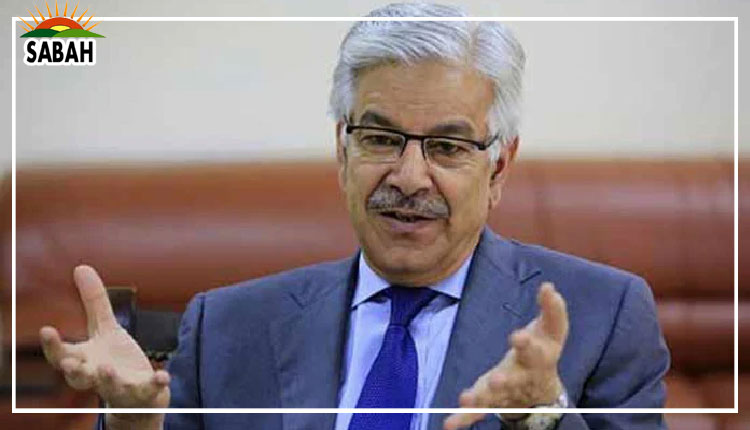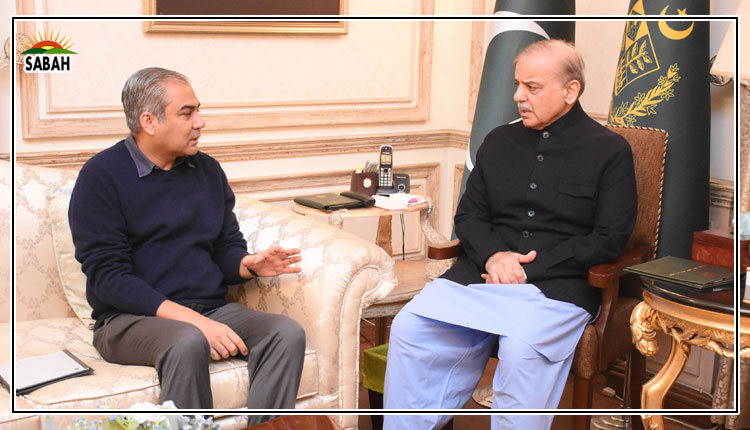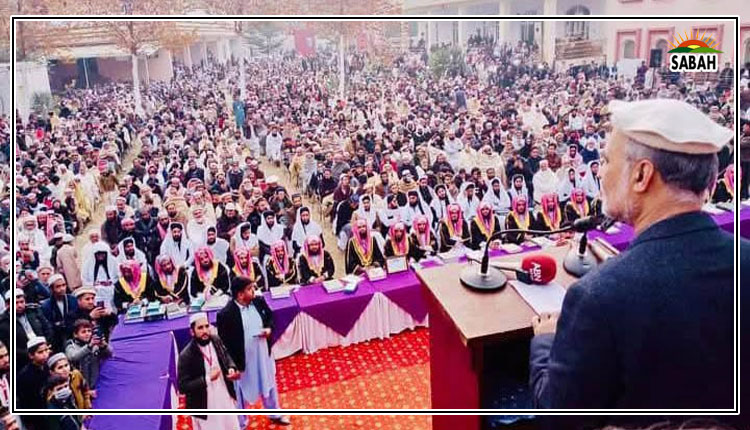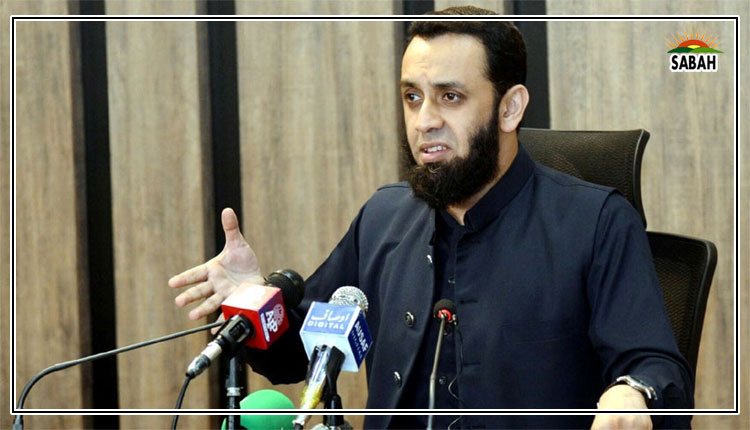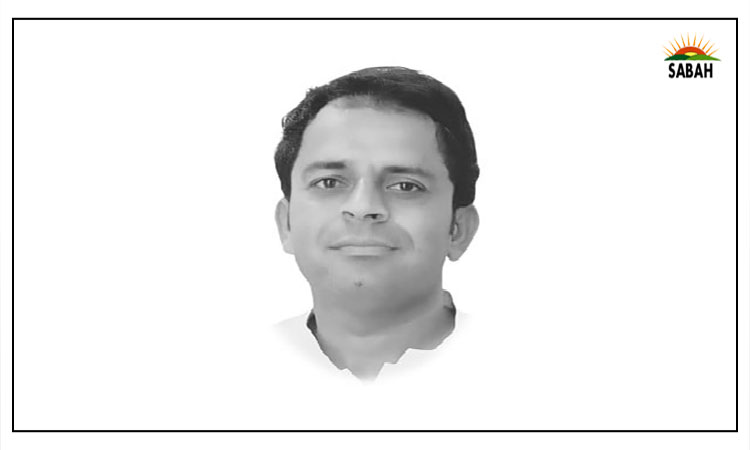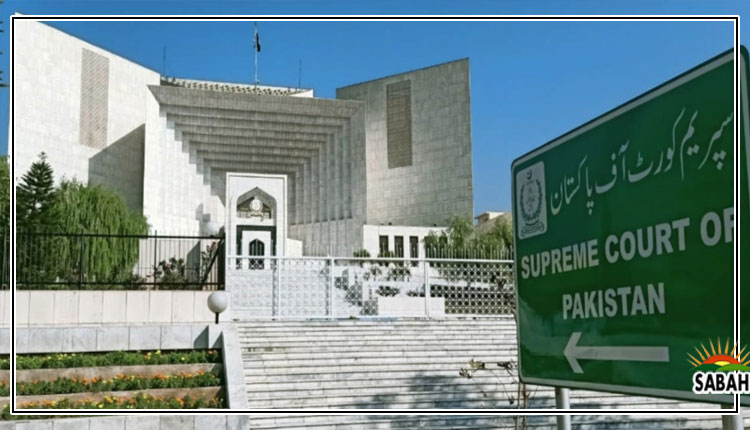‘Others’ will continue becoming powerful until & unless Parliament becomes strong: CJP Qazi Faez Isa
ISLAMABAD, April 30 (SABAH): Chief Justice of Pakistan (CJP) Justice Qazi Faez Isa on Tuesday said that “others” will continue becoming powerful until and unless Parliament becomes strong, as the Supreme Court resumed the suo motu hearing pertaining to allegations of spy agencies’ interference in judicial affairs. Meanwhile Justice Athar Minallah has remarked that the state had to protect the country’s judges and the independence of the judiciary.
Headed by Chief Justice of Pakistan Justice Qazi Faez Isa, the bench included Justices Syed Mansoor Ali Shah, Jamal Khan Mandokhail, Athar Minallah, Musarrat Hilali and Naeem Akhtar Afghan. The proceedings were streamed live on the SC’s website and its YouTube channel.
In late March, it emerged that six IHC judges — out of a total strength of eight — wrote a startling letter to the Supreme Judicial Council (SJC) members, regarding attempts to pressure judges through the abduction and torture of their relatives as well as secret surveillance inside their homes.
The letter was signed by judges Mohsin Akhtar Kayani, Tariq Mehmood Jahangiri, Babar Sattar, Sardar Ejaz Ishaq Khan, Arbab Muhammad Tahir and Saman Rafat Imtiaz.
On Tuesday, Attorney General for Pakistan (AGP) Mansoor Usman Awan appeared before the apex court. The SC ordered the petitioners — the bar councils and associations — to submit a response by the next hearing on May 7, adding that it would be appropriate if it was unanimous.
It also said that the federal government could submit its response or proposals through the AGP if it wanted to do so. CJP Isa said that if the allegations “refer to any [intelligence] agency, the said agency should respond” through the AGP.
At the outset of the hearing, CJP Isa clarified that prior to the last hearing, the SC’s bench formation committee had “decided that all available judges in Islamabad should immediately convene”.
“There was no pick and choose; whoever was available was put together,” he observed, noting that Justice Afridi had recused himself. Recalling that he had hinted at a full court, Justice Isa said that it could not be convened as two judges were unavailable.
The top judge noted that there was “so much polarisation in the country” and “people may not be so interested in the independence of the judiciary but in their own particular viewpoint to prevail”. Reiterating his remarks from the previous hearing, Justice Isa reiterated that “attacks” against ex-CJP Tasadduq Hussain Jillani were “upsetting”.
“If somebody can impose a will upon this court, that is also interference. Interference can be from within, from without, from intelligence agencies, from your colleagues, from your family members, from social media, from everybody else,” CJP Isa said.
“A judge’s judgment and order shows, speaks, shouts how much interference there is or isn’t; how much independence there is or isn’t,” he added.
During the hearing, the top judge also remarked that he was “not responsible for the history of the Supreme Court. I am only responsible from the day I became chief justice. I have gone ahead with an inclusive approach.”
The chief justice asked AGP Awan if he had gone through the recommendations made by the IHC judges, to which the latter replied in the negative. Justice Isa then asked Awan about how to proceed with the matter.
Here, Justice Minallah remarked: “These are not recommendations or suggestions but a charge sheet.”
After the AGP read the proposals out loud, CJP Isa observed, “We should not interfere in the high court’s work. The results of interference in high courts’ matters have not been good in the past.”
Justice Minallah noted that the IHC judges had alleged “continuous meddling” and asked if their recommendations were unanimous. Awan replied that it seemed so, at which the judge observed that no judge had disagreed.
The SC then ordered that the proposals made by the IHC judges be made public. Justice Isa said, “When everything is airing on the media, we may make this public as well.”
When the chief justice asked if a high court was not empowered by the Constitution to implement the said suggestions, AGP Awan replied that it had the authority to take action on all the points.
Justice Isa observed that the SC should limit itself to the high courts’ suggestions and not act on those made by every other person.
“I will never accept any interference from any source and there has not been a single complaint since my assumption of this office to me or the SC’s registrar,” the top judge remarked.
He also asked if it amounted to interference when the presidents of the lower judiciary’s bar associations “force their way into the judges’ chambers”.
At this point during the hearing, Justice Minallah emphasised: “If the state becomes the aggressor against a judge, that is what all the high courts are highlighting and that is a serious matter.
“The high court of Lahore is endorsing what the IHC has said […] and we all know that it is happening and has happened,” he added.
Justice Minallah highlighted that the judges “fear reporting” such incidents. In an apparent reference to IHC’s Justice Babar Sattar, he said: “Since the last hearing, what has happened to an IHC judge? His personal data which cannot accessed by a private person was put on social media.” “That is an intimidation,” he observed.
“The state is to protect the judges and independence of the judiciary. When it becomes the aggressor, which each high court is saying; that is what is the issue and it is happening.
“It is a phenomenon that has happened for the last 76 years and this is what each high court is endorsing. It is happening today,” Justice Minallah observed.
Justice Shah noted that the matter had landed before the SC and questioned if the apex court could “just brush aside” the matter.
“We should empower the high courts. We are, by interfering in this matter, actually empowering the high courts, the district judiciary, the entire judiciary; I don’t think it’s interference in any matter,” he observed.
Justice Shah noted there was a need to “lay down a court which is a clear firewall against all sorts of excesses” and that a “system” needed to be put in place rather than dealing with individual incidents.
Justice Mandokhail said that “especially two of our learned members of the bench have been targeted” since the SC took up the matter. “This is not interference. This is a threat.
“Leave the high court judges aside […] the notice we have taken; what is happening with us? Can there be independence in this manner?” the judge asked.
Justice Minallah remarked that the “entire onus was on the state” when data of judges’ family members was “stolen” from government departments, such as the National Database and Registration Authority (Nadra).
“There are judges we know who are just told ‘your child studies at so and so place’ and it is the state which is doing it,” he added.
Justice Hilali wondered why all high courts did not implement the suggested actions by themselves and why they were seeking the SC’s permission.
Justice Shah observed that the high courts had “all powers, including that of contempt of court [notice]”, stressing the need to empower each court of the country.
He said the current suo motu case was “doing wonders” as it had led to the judiciary “mustering the courage” to write the letter.
Meanwhile, Justice Minallah said: “The state is to protect the independence of the judiciary. There has been a partnership between the judiciary and the establishment for the past 76 years. That culture continues.”
CJP Isa then responded: “I don’t know. At least there’s no culture here. […] If there was any interference in my work and if I could not withstand the pressure, I would go home.”
He went on to recall that he had been Balochistan High Court’s (BHC) chief justice for five years and offered to ask the judges there about any alleged interference.
“Since I have been a judge here (at SC), I have fought for the independence of the judiciary from within,” Justice Isa asserted.
“And the greatest threat to independence was from the Supreme Court, not from the outside, in my opinion. I have lived through it; I have experienced it so these are not empty words. Please do not include me in the 76 years of Pakistan’s history and there are many such persons who should not be included.
Justice Minallah responded to CJP Isa, saying: “I haven’t condemned all. There have been exceptions.”
He added that “no one could influence a single judge” during his own tenure as the IHC chief justice.
At one point during the hearing, Justice Shah said, “‘Someone is watching me, someone is noting me, there is a device fixed in this room’ — why does this happen?
“Should this happen? Should there be such a culture in a democratic country?” he asked.
Here, Justice Minallah observed: “Intelligence agencies function under the prime minister. If the intelligence institutions do something, the prime minister and his cabinet are responsible for it.”
He pointed out that “nothing was free” since under the Constitution, the “image of our armed forces has to be protected” as they were the protectors and defenders of the country.
Addressing AGP Awan, CJP Isa questioned who filed review petitions against the 2019 SC judgment on the Faizabad sit-in case.
Remarking that he would “explain how internal interference takes place”, Justice Isa highlighted that the review pleas were not fixed for hearing for more than four years and wondered if there was any clarification for why it was not.
“Is the executive responsible for this as well?” he quipped, adding that the Parliament should play its role here.
“Did the world not know who was running Pakistan at that time?” he asked. “But perhaps you people wanted to save them, perhaps not,” the top judge said while addressing the AGP.
“I had given it in writing that General Faiz Hameed was behind this. The matter was left to the then-government,” CJP Isa said, noting that his wife had also recorded her statement at a police station.
“When people deviate from the track, then legislation becomes necessary,” the chief justice asserted, wondering when the government would finally legislate. The CJP remarked that until the Parliament became strong, other powers would continue to strengthen.
Here, Justice Shah questioned under which law intelligence agencies came into existence, and what action could be taken against them in case they interfered in other matters.
Recalling the attorney general’s statement from the previous of “political engineering from 2017-2018”, Justice Minallah asked Awan who was in the government at that time. The AGP replied that it was the PML-N’s tenure, at which the judge asked him, “Are you saying that the government was helpless?”
At this point during the hearing, CJP Isa noted, “The bureaucracy also gets calls; some [judges] work [while] some don’t. Those who don’t are made OSDs (officers on special duty).
Justice Minallah then remarked that there would be no pressure if the judiciary “did not open its doors”. To this, Justice Shah said there should be a case of misconduct against those who did “open the doors”.
Justice Minallah noted that when a judge raised their voice, a smear campaign was launched against him. “Look what the government did when such a major verdict came on the Justice Siddiqui case,” he said. AGP Awan then said, “A few former judges were also involved in this.”
Justice Minallah replied that action should be taken against whoever was involved, even a former chief justice. He remarked that references were filed against a judge if they spoke the truth, at which Justice Isa said: “Those references arrive before us in the end. We should not paint such a poor image of us.”
“You have read the suggestions of three high courts — no one has said there is no intervention,” Justice Minallah said. “This means that interference is taking place.”
Justice Shah also said that no high court had indicated to resolve the issue on their own, stressing the need for a “system that closes the door of interference”.
Here, CJP Isa observed that if the SJC had to make recommendations, it could do so separately and told the AGP to not discuss the council as the bench was hearing the case “on the judicial side, not administrative”.
Justice Shah then said that the bench could “pass any order” while Justice Minallah said the apex court could “strike down as well as amend the SJC’s decisions”. “We can also advise the executive on important matters,” he added.
Justice Mandokhail stated that the court would take all steps while remaining in its jurisdiction. ہ At one point, CJP Isa noted, “When we seek reports from intelligence agencies for appointing judges, we give them a chance to interfere. When you have monitoring judges appointed and include them in JITS (joint investigation teams), they will get a chance to interfere.”
“Some people put aside Constitutional interests for personal benefits. Some people were standing at one position at a specific time but were now at a different one,” the top judge added.
Addressing AGP Awan, Justice Minallah highlighted that in a press conference after the meeting between him, CJP Isa and PM Shehbaz, the IHC judges’ move was termed “misconduct”.
The AGP responded it was wrong if their letter was called “misconduct”. He later said, “I have confirmed that the misconduct sentence was not said during the press conference.”
Justice Mandokhail remarked that the Peshawar High Court’s (PHC) response was the “most serious” as they had mentioned “receiving death threats”.
The SC then issued notices to the Pakistan Bar Council and the SC Bar Association, seeking their recommendations. The CJP added that other respondents may also provide their input if they wanted.
“It would be appropriate and helpful if the bar associations and bar councils try to come together to file one document on things which they agree with and may also file separately those points which they are not in agreement with,” he ordered.
Stating that the apex court wanted to conclude the matter soon, the top judge said the AGP was to submit a reply on behalf of the federation and that a separate document be filed if the federal government had any proposals.
CJP Isa said that if the allegations “refer to any [intelligence] agency, the said agency should respond” through the AGP. “If any specific allegation has emerged, the response to it should also come,” he added.
The court stated that no new petitioners would be made respondents in the case. Subsequently, the hearing was adjourned till May 7.



